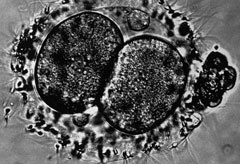Ugly men more likely to get women pregnant
Desirable males restrict their ‘sperm load’

Desirable males restrict their ‘sperm load’
Handsome men who are lucky in love may not be the best bet as a mate for women hoping to get pregnant, researchers have said. Uglier men with fewer notches on their belts are likely to be more productive between the sheets, it is claimed.
Research suggests that in many species, the most desirable males restrict their ‘sperm load’ with each mating to ensure enough to go around. The same could be true of humans and other primates, say scientists.
If they are right, women looking for the best chance of getting pregnant might be advised to avoid handsome lotharios. The theory proposes that males have evolved to look for the optimum ‘sperm load’ per mating. This varies depending on how many available females there are to mate with, and what the chances of mating with them are.
A smaller ‘sperm load’ reduces the chances of any individual female getting pregnant. Such a trade-off is seen in the wild and has been observed in chickens and fish.
One member of the team, PhD student Sam Tazzyman, from the Centre for Mathematics and Physics in the Life sciences and Experimental biology (CoMPLEX) at University College London, said: ‘In some species, females mate with many different males. Each male's sperm competes with that of other males in a process known as 'sperm competition'.
‘How a male negotiates this trade-off depends on how easy he finds it to attract females. The more attractive a male is, the more females will be willing to mate with him, reducing the value of each mating to him. This means it is optimal for him to contribute fewer sperm per mating.
'Although this reduces fertility per mating, it maximises the number of offspring he sires overall. Less attractive males secure fewer matings but value each of them more highly, and by allocating more sperm to each mating make the most of their meagre opportunities.’
Whether or not the same principle applied to humans and other primates was still unknown, said the researchers – but there every possibility that it did.
CLICK HERE FOR MORE HEALTH NEWS
ARE YOU A TWITTERER? FOLLOW US HERE!
BECOME A MARIE CLAIRE FACEBOOK FAN HERE

The leading destination for fashion, beauty, shopping and finger-on-the-pulse views on the latest issues. Marie Claire's travel content helps you delight in discovering new destinations around the globe, offering a unique – and sometimes unchartered – travel experience. From new hotel openings to the destinations tipped to take over our travel calendars, this iconic name has it covered.